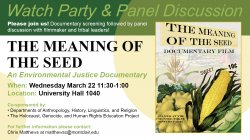Screening of Documentary “Meaning of the Seed”, a film about Native American justice and resilience in NJ, followed by discussion with filmmaker and tribal leaders
Posted in: Native American and Indigenous Studies, News

Screening of Documentary “Meaning of the Seed”, a film about Native American justice and resilience in NJ, followed by discussion with filmmaker and tribal leaders
When: Wednesday March 22 11:30-1:00
Where: University Hall 1040
Please join us! Documentary screening followed by panel discussion with filmmaker and tribal leaders!
Film Description: In September 2020 the documentary crew filmed a talking circle of Ramapough elders, relations, and partners at the Munsee Three Sisters Medicinal Farm. The resulting documentary- The Meaning of the Seed – is structured along the layers of the landscape, chronologically working up from the ground to the overstory. The first section, SOIL, describes the history of contamination in Ringwood and the contaminated ground that many Native Americans live on or near. SEED recounts the struggles of the Ramapough and their cultural connections to the land. GROWTH chronicles the Ramapough’s cultural restoration program and efforts to work towards food sovereignty through their recently inaugurated Munsee Three Sisters Medicinal Farm in Newton, NJ. Finally, SUNLIGHT is a call to action, as the talking circle participants urge a younger generation to become involved with environmental justice movements.
The ancestral home of the Ramapough Lunaape (Lenape) Turtle Clan is Ringwood, New Jersey. The landscape includes former iron mines, Native American rock shelters, a forest in which people hunt and forage for food, a large drinking water reservoir, deep pockets of contaminated soil, streams that now flow with orange water, a stew of different chemical toxicants from the former Ford manufacturing plant, and the Ringwood Mines/Landfill Superfund Site. People live in the Superfund site, just upstream from the Wanaque Reservoir, which provides drinking water to millions of New Jersey residents.
Co-sponsored by:
• Departments of Anthropology, History, Linguistics, and Religion
• The Holocaust, Genocide, and Human Rights Education Project
• The University Senate Land Acknowledgment Committee
For further information please contact: Chris Matthews at matthewsc@montclair.edu
